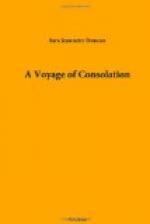CHAPTER XVIII.
Out of indulgence to Dicky we lingered in Florence three or four days longer than was at all convenient, considering, as the Senator said, the amount of ground we had to cover before we could conscientiously recross the Channel. But neither poppa nor momma were people to desert a fellow-countryman in distress in foreign parts, especially in view of this one’s pathetic reliance upon our sympathy and support, as a family. We all did our best toward the distraction of what momma called his poor mind, though I cannot say that we were very successful. His poor mind seemed wholly taken up with one anticipative idea, and whatever failed to minister to that he hadn’t, as poppa sadly said, any use for. The cloisters of San Marco had no healing for his spirit, and when we directed his attention to the solitary painting on the wall with which Fra Angelico made a shrine of each of its monastic cubicles he merely remarked that it was more than you got in most hotels, and turned joylessly away. Even the charred stick that helped to martyr Savonarola left him cold. He said, indifferently, that it was only the natural result of mixing up politics and religion, and that certain Chicago ministers who supported Bryan from the pulpit might well take warning. But his words were apathetic; he did not really care whether those Chicago ministers went to the stake or not. We stood him before the bronze gates of Ghiberti, and walked him up and down between rows of works in pietra dura, but without any permanent effect, and when he contemplated the consecrated residences of Cimabue and Cellini, we could see that his interest was perfunctory, and that out of the corner of his eye he really considered passing fiacres. I read to him aloud from “Romola,” and momma bought him an English and Italian washing book that he might keep a record of his camicie and his fazzoletti—it would be so interesting afterwards, she thought—while the Senator exerted himself in the way of cheerful conversation, but it was very discouraging. Even when we dined at the fashionable open air restaurant in the Cascine, with no less a person than Ouida, in a fluff of grey hair and black lace, at the next table, and the most distinguished gambler of the Italian aristocracy presenting a narrow back to us from the other side, he permitted poppa to compare the quality of the beef fillets unfavourably with those of New York in silence, and drank his Chianti with a lack-lustre eye.




